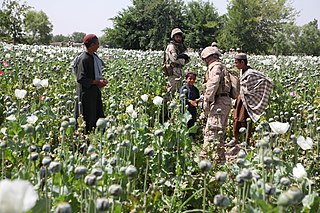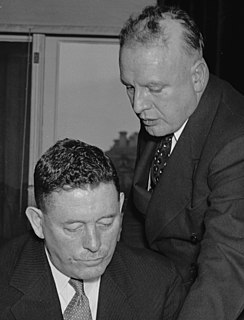
The Controlled Substances Act (CSA) is the statute establishing federal U.S. drug policy under which the manufacture, importation, possession, use, and distribution of certain substances is regulated. It was passed by the 91st United States Congress as Title II of the Comprehensive Drug Abuse Prevention and Control Act of 1970 and signed into law by President Richard Nixon. The Act also served as the national implementing legislation for the Single Convention on Narcotic Drugs.

The prohibition of drugs through sumptuary legislation or religious law is a common means of attempting to prevent the recreational use of certain intoxicating substances.

The Single Convention on Narcotic Drugs of 1961 is an international treaty that prohibits production and supply of specific narcotic drugs and licenses other drugs with similar effects for medical treatment and research. The treaty updated the Paris Convention of 13 July 1931, to include the vast number of synthetic opioids invented in the intervening thirty years and to add a mechanism for more easily including new ones. From 1931 to 1961, most of the families of synthetic opioids had been developed, including drugs related to methadone, pethidine (meperidine/Demerol), morphinans and dextromoramide. Research on fentanyls and piritramide was also nearing fruition at that point.
The International Narcotics Control Board (INCB) is an independent body responsible for monitoring the control of substances pursuant to the three United Nations drug control conventions, and assisting Member States in their efforts to implement those conventions. It plays an important role in monitoring the production and trade of narcotics and psychotropics, as well as their availability for medical and scientific purposes, and in deciding which precursors should be regulated.

The United Nations Convention Against Illicit Traffic in Narcotic Drugs and Psychotropic Substances of 1988 is one of three major drug control treaties currently in force. It provides additional legal mechanisms for enforcing the 1961 Single Convention on Narcotic Drugs and the 1971 Convention on Psychotropic Substances. The Convention entered into force on November 11, 1990. As of June 2020, there are 191 Parties to the Convention. These include 186 out of 193 United Nations member states and the Holy See, the European Union, the Cook Islands, Niue, and the State of Palestine.

The United Nations Commission on Narcotic Drugs (CND) is one of the functional commissions of the United Nations Economic and Social Council (ECOSOC), and is the central drug policy-making body within the United Nations System. The CND has important functions under the various international drug control conventions.
The Agreement concerning the Manufacture of, Internal Trade in and Use of Prepared Opium, also known as the Agreement concerning the Suppression of the Manufacture of, Internal Trade in, and Use of, Prepared Opium, was a treaty promulgated in Geneva on 11 February 1925. The treaty was ratified by the British Empire, the British Raj, France, Japan, the Netherlands, Portugal, and Siam.

The Protocol Amending the Agreements, Conventions and Protocols on Narcotic Drugs concluded at The Hague on 23 January 1912, at Geneva on 11 February 1925 and 19 February 1925, and 13 July 1931, at Bangkok on 27 November 1931 and at Geneva on 26 June 1936 was a treaty, signed on 11 December 1946 at Lake Success, that shifted the drug control functions previously assigned to the League of Nations to the United Nations. As the Protocol's official title says, it modifies the provisions of the:
The Protocol for Limiting and Regulating the Cultivation of the Poppy Plant, the Production of, International and Wholesale Trade in, and Use of Opium, signed on 23 June 1953 in New York City, was a drug control treaty, promoted by Harry J. Anslinger, with the purpose of imposing stricter controls on opium production.
The Convention for the Suppression of the Illicit Traffic in Dangerous Drugs was a drug control treaty signed in 1936.
A drug policy is the policy, usually of a government, regarding the control and regulation of psychoactive substances, particularly those that are addictive or cause physical and mental dependence. Governments try to combat drug addiction or dependence with policies that address both the demand and supply of drugs, as well as policies that mitigate the harms of drug use, and for medical treatment. Demand reduction measures include voluntary treatment, rehabilitation, substitution therapy, overdose management, alternatives to incarceration for drug related minor offenses, medical prescription of drugs, awareness campaigns, community social services, and support for families. Supply side reduction involves measures such as enacting foreign policy aimed at eradicating the international cultivation of plants used to make drugs and interception of drug trafficking, fines for drug offenses, incarceration for persons convicted for drug offenses. Policies that help mitigate drug use include needle syringe programs and drug substitution programs, and free facilities for testing a drug's purity.
The illegal drug trade in China is influenced by factors such as history, location, size, population, and current economic conditions. China has one-fifth of the world's population and a large and expanding economy. China's large land mass, close proximity to the Golden Triangle, Golden Crescent, and numerous coastal cities with large and modern port facilities make it an attractive transit center for drug traffickers. Opium has played an important role in the country's history since before the First and Second Opium Wars in the mid-19th century.

The Convention on Psychotropic Substances of 1971 is a United Nations treaty designed to control psychoactive drugs such as amphetamine-type stimulants, barbiturates, benzodiazepines, and psychedelics signed in Vienna, Austria on 21 February 1971. The Single Convention on Narcotic Drugs of 1961 did not ban the many newly discovered psychotropics, since its scope was limited to drugs with cannabis, coca, and opium-like effects.
Drug prohibition law is prohibition-based law by which governments prohibit, except under licence, the production, supply, and possession of many, but not all, substances which are recognized as drugs, and which corresponds to international treaty commitments in the Single Convention on Narcotic Drugs 1961, the Convention on Psychotropic Substances 1971, and the United Nations Convention Against Illicit Traffic in Narcotic Drugs and Psychotropic Substances 1988.
Koli Kouame was appointed by UN Secretary-General Kofi Annan on 6 September 2004 as the Secretary of the International Narcotics Control Board and Chief of the International Narcotics Control Board Secretariat. In this position, Mr. Kouame was in charge of the permanent staff in at the United Nations in Vienna working on the international drug control treaties. The Board has had predecessors since the time of under the League of Nations, starting in 1909 in Shanghai with the International Opium Commission, the first international drug control conference. The International Opium Convention of 1925 established the Permanent Central Board. That Board started its work in 1929. After the dissolution of the League, the 1946 Protocol Amending the Agreements, Conventions and Protocols on Narcotic Drugs concluded at The Hague on 23 January 1912, at Geneva on 11 February 1925 and 19 February 1925, and 13 July 1931, at Bangkok on 27 November 1931 and at Geneva on 26 June 1936, created a Supervisory Body to administer the estimate system. The functions of both bodies were merged into the Board by the 1961 Single Convention on Narcotic Drugs. The composition of the Board under the Single Convention was strongly influenced by the 1946 treaty.

The history of opium in China began with the use of opium for medicinal purposes during the 7th century. In the 17th century the practice of mixing opium with tobacco for smoking spread from Southeast Asia, creating a far greater demand.

The Treaties of the European Union are a set of international treaties between the European Union (EU) member states which sets out the EU's constitutional basis. They establish the various EU institutions together with their remit, procedures and objectives. The EU can only act within the competences granted to it through these treaties and amendment to the treaties requires the agreement and ratification of every single signatory.
"International drug convention" could mean any of several international conventions:
The Cannabis Control Law of Japan, aka 1948 Law No. 124, is the national law of Japan concerning cannabis possession, cultivation, and transfer.








